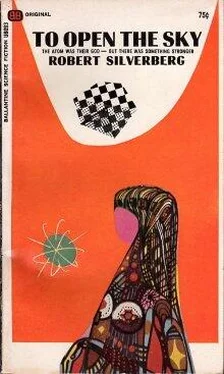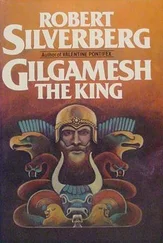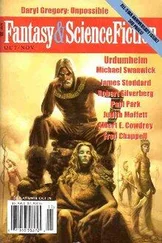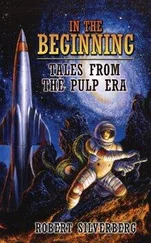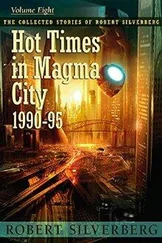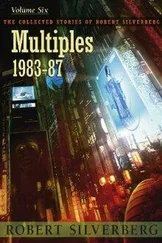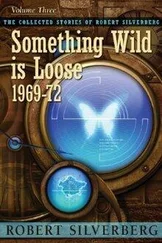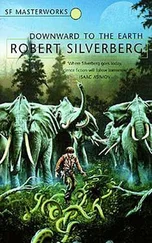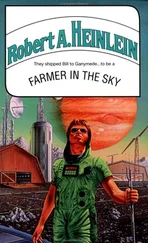Robert Silverberg - To Open the Sky
Здесь есть возможность читать онлайн «Robert Silverberg - To Open the Sky» весь текст электронной книги совершенно бесплатно (целиком полную версию без сокращений). В некоторых случаях можно слушать аудио, скачать через торрент в формате fb2 и присутствует краткое содержание. Год выпуска: 1967, Издательство: Ballantine Books, Жанр: Фантастика и фэнтези, на английском языке. Описание произведения, (предисловие) а так же отзывы посетителей доступны на портале библиотеки ЛибКат.
- Название:To Open the Sky
- Автор:
- Издательство:Ballantine Books
- Жанр:
- Год:1967
- ISBN:нет данных
- Рейтинг книги:5 / 5. Голосов: 1
-
Избранное:Добавить в избранное
- Отзывы:
-
Ваша оценка:
- 100
- 1
- 2
- 3
- 4
- 5
To Open the Sky: краткое содержание, описание и аннотация
Предлагаем к чтению аннотацию, описание, краткое содержание или предисловие (зависит от того, что написал сам автор книги «To Open the Sky»). Если вы не нашли необходимую информацию о книге — напишите в комментариях, мы постараемся отыскать её.
To Open the Sky — читать онлайн бесплатно полную книгу (весь текст) целиком
Ниже представлен текст книги, разбитый по страницам. Система сохранения места последней прочитанной страницы, позволяет с удобством читать онлайн бесплатно книгу «To Open the Sky», без необходимости каждый раз заново искать на чём Вы остановились. Поставьте закладку, и сможете в любой момент перейти на страницу, на которой закончили чтение.
Интервал:
Закладка:
The car Mondschein had provided dropped Martell off at the Martian Embassy, a blocky little building fronting on the wide plaza that seemed to be the entire town. The Martians had been instrumental in getting Martell to Venus in the first place, and a call on the Ambassador was of priority importance.
The Martians breathed Earth-type air, and they did not care to adapt themselves to Venusian conditions. Once he entered the building, therefore, Martell had to accept a breathing-hood that would protect him against the atmosphere of the planet of his birth.
The Ambassador, Freeman Nat Weiner, was about twice Martell’s age, perhaps even older—close to ninety, even. His frame was powerful, with shoulders so wide they seemed out of proportion to his hips and legs.
Weiner said, “So you’re here. I really thought you had more sense.”
“We’re determined people, Freeman Weiner.”
“So I know. I’ve been studying your ways for a long time.” Weiner’s eyes became remote. “More than sixty years, in fact. I knew your Coordinator Kirby before his conversion—did he ever tell you that?”
“He didn’t mention it,” Martell said. His flesh crept Kirby had joined the Vorster Brotherhood about twenty years before Martell had been born. To live a century was nothing unusual these days, and Vorst himself was surely into his twelfth or thirteenth decade, but it was chilling all the same to think of such a span of years.
Weiner smiled. “I came to Earth to negotiate a trade deal, and Kirby was my chaperon. He was with the U.N. then. I gave him a hard time. I was a drinker then. Somehow I don’t think he’ll ever forget that night.” His gaze riveted on Martell’s unblinking eyes. “I want you to know, Brother, that I can’t provide any protection for you if you’re attacked. My responsibility extends only to Martian nationals.”
“I understand.”
“My advice is the same as it’s been from the start. Go back to Earth and live to a ripe old age.”
“I can’t do that, Freeman Weiner. I’ve come with a mission to accomplish.”
“Ah, dedication! Wonderful! Where will you build your chapel?”
“On the road leading to town. Perhaps closer to town than the Harmonist place.”
“And where will you stay until it’s built?”
“I’ll sleep in the open.”
“There’s a bird here,” Weiner said. “They call it a shrike. It’s as big as a dog, and its wings look like old leather, and it has a beak like a spear. I once saw it dive from five hundred feet at a man taking a nap in an open field. The beak pinned him to the ground.”
Unperturbed, Martell said, “I survived an encounter with a Wheel today. Perhaps I can dodge a shrike, too. I don’t intend to be frightened away.”
Weiner nodded. “I wish you luck,” he said.
Luck was about all Martell was going to get from the Ambassador, but he was grateful even for that. The Martians were cool toward Earth and all it produced, including its religions. They did not actually hate Earthmen, as the Venusians of both castes appeared to do; the Martians were still Earth-like themselves, and not changed creatures whose bond with the mother world was tenuous at best. But the Martians were tough, aggressive frontiersmen who looked out only for themselves. They served as go-betweens for Earth and Venus because there was profit in it; they accepted missionaries from Earth because there was no harm in it. They were tolerant, in their way, but aloof.
Martell left the Martian Embassy and set about his tasks. He had money and he had energy. He could not hire Venusian labor directly, because it would be an act of pollution for a Venusian even of the low caste to work for an Earthman, but it was possible to commission workmen through Weiner. The Martians, naturally, received a fee for serving as agents.
Workmen were hired and a modest chapel was erected. Martell set up his pocket-size reactor and readied it for use. Alone in the chapel, he stood in silence as the Blue Fire flickered into glowing life.
Martell had not lost his capacity for awe. He was a worldly man, no mystic, yet the sight of the radiation streaming from the water-shielded reactor worked its magic on him, and he dropped to his knees, touching his forehead in the gesture of submission. He could not carry his religious feeling to the stage of idolatry, as the Harmonists did, but he was not without a sense of the might of the movement to which he had pledged his life.
The first day Martell simply carried out the ceremonies of dedication. On the second and third and fourth he waited hopefully for some low-caster who might be curious enough to enter the chapel. None came.
Martell did not care to seek worshipers, not just yet. He preferred that his converts be voluntary, if possible. The chapel remained empty. On the fifth day it was entered—but only by a frog-like creature ten inches long, armed with wicked little horns on its forehead and delicate, deadly-looking spines that sprouted from its shoulders. Were there no life-forms on this planet that went without armor or weaponry, Martell wondered? He shooed the frog out. It growled at him and lunged at his foot with its horns. Martell drew his foot back barely in time, interposing a chair. The frog stabbed at the wood, sank inch-deep with the left horn; when it withdrew, an iridescent fluid trickled down the leg of the chair, burning a pathway through the wood. Martell had never been attacked by a frog before. On the second try he got the animal out the door without suffering harm. A pretty planet, he thought.
The next day came a more cheering visitor: the boy Elwhit. Martell recognized him as one of the boys who had been teleporting dirt behind the Harmonist place. He appeared from nowhere and said to Martell, “You’ve got Trouble Fungus out there.”
“Is that bad?”
“It kills people. Eats them. Don’t step in it. Are you really a religious?”
“I like to think so.”
“Brother Christopher says you shouldn’t be trusted, that you’re a heretic. What’s a heretic?”
“A heretic is a man who disagrees with another man’s religion,” Martell said. “I happen to think Brother Christopher’s the heretic, as a matter of fact. Would you like to come inside?”
The boy was wide-eyed, endlessly curious, restless. Martell longed to question him about his apparent telekinetic powers, but he knew it was more important at the moment to snare him as a convert. Questions at this point might only frighten him away. Patiently, elaborately, Martell explained what the Vorsters had to offer. It was hard to gauge the boy’s reaction. Did abstract concepts mean anything to a ten-year-old? Martell gave him Vorst’s book, the simple text. The boy promised to come back.
“Watch out for the Trouble Fungus,” he said as he left.
A few days passed. Then the boy returned, with the news that Mondschein had confiscated his book. Martell was pleased at that, in a way. It was a sign of panic among the Harmonists. Let them turn Vorster teachings into something forbidden, and he’d win all of Mondschein’s four thousand converts away.
Two days after Elwhit’s second visit, Martell had a different caller—a broad-faced man in Harmonist robes. Without introducing himself, he said, “You’re trying to steal that boy, Martell. Don’t do it.”
“He came of his own free will. You can tell Mondschein—”
“The child has curiosity. But he’s the one who’ll suffer. If you keep allowing him to come here. Turn him away the next time, Martell. For his own sake.”
“I’m trying to take him away from you for his own sake,” the Vorster replied quietly. “And any others who’ll come to me. I’m ready to battle with you to have him.”
“You’ll destroy him,” said the Harmonist. “He’ll be pulled apart in the struggle. Let him be. Turn him away.”
Читать дальшеИнтервал:
Закладка:
Похожие книги на «To Open the Sky»
Представляем Вашему вниманию похожие книги на «To Open the Sky» списком для выбора. Мы отобрали схожую по названию и смыслу литературу в надежде предоставить читателям больше вариантов отыскать новые, интересные, ещё непрочитанные произведения.
Обсуждение, отзывы о книге «To Open the Sky» и просто собственные мнения читателей. Оставьте ваши комментарии, напишите, что Вы думаете о произведении, его смысле или главных героях. Укажите что конкретно понравилось, а что нет, и почему Вы так считаете.
